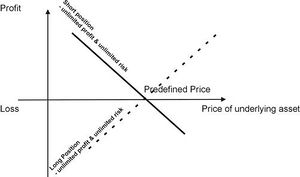Futures: Difference between revisions
(Infobox update) |
(The LinkTitles extension automatically added links to existing pages (<a target="_blank" rel="noreferrer noopener" class="external free" href="https://github.com/bovender/LinkTitles">https://github.com/bovender/LinkTitles</a>).) |
||
| Line 14: | Line 14: | ||
}} | }} | ||
Future is an contract to either buy or sell an asset at specified [[price]] on a given date in the future. In other words, it is a commitment to buy or sell a specified quantity of commodity or financial instrument at a price established now, but payment and delivery occur at a specified future date. The commodities can be: gold, oil, cattle, frozen orange juice. Financial instruments can be: currency, [[bonds]], index. Futures are exchange traded. | Future is an contract to either buy or sell an asset at specified [[price]] on a given date in the future. In other words, it is a commitment to buy or sell a specified quantity of commodity or [[financial instrument]] at a price established now, but payment and delivery occur at a specified future date. The commodities can be: gold, oil, cattle, frozen orange juice. Financial instruments can be: currency, [[bonds]], index. Futures are exchange traded. | ||
== Trading == | == Trading == | ||
Revision as of 05:54, 20 January 2023
| Futures |
|---|
| See also |
Future is an contract to either buy or sell an asset at specified price on a given date in the future. In other words, it is a commitment to buy or sell a specified quantity of commodity or financial instrument at a price established now, but payment and delivery occur at a specified future date. The commodities can be: gold, oil, cattle, frozen orange juice. Financial instruments can be: currency, bonds, index. Futures are exchange traded.
Trading
The buyer of futures contract, takes "long position", agrees to receive delivery.
The seller takes "short position" and is obliged to make delivery. If you think that the price of your stock will be higher than it is today, you want to go long. If you think the stock price will be lower than you'll go short. Future contracts are marked to market and they require daily settlements of gains and losses as long as the contract remains open. It is a zero sum game - the short positions exactly offset the long positions. The short side's profit or loss is the long side's loss or profit. However, initially both buyer and seller are obliged to make a payment * called "margin", which act like security deposit to ensure contract performance. They usually constitute small percentage of the value of underlying asset. A typical margin can be anywhere from 10 to 20 percent of the price of the contract.
See also:
References
- Futures, options, and swaps Robert W. Kolb, Blackwell Pub 2003, p. 13, 80-82
- Financial risk manager handbook Philippe Jorion, GARP. Hoboken: John Wiley & Sons 2005, p. 117-199
- Galloway, T. M., & Kolb, R. W. (1996). Futures prices and the maturity effect. Journal of Futures Markets, 16(7), 809-828.
Author: Katarzyna Wierzbinska
